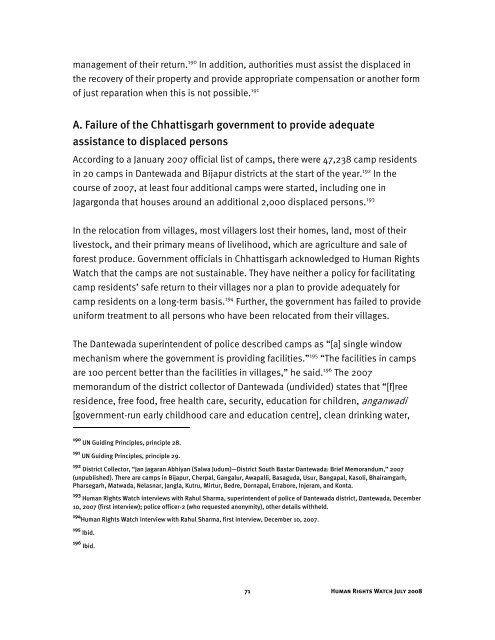âBeing Neutral is Our Biggest Crimeâ - Global Coalition to Protect ...
âBeing Neutral is Our Biggest Crimeâ - Global Coalition to Protect ...
âBeing Neutral is Our Biggest Crimeâ - Global Coalition to Protect ...
Create successful ePaper yourself
Turn your PDF publications into a flip-book with our unique Google optimized e-Paper software.
management of their return. 190 In addition, authorities must ass<strong>is</strong>t the d<strong>is</strong>placed in<br />
the recovery of their property and provide appropriate compensation or another form<br />
of just reparation when th<strong>is</strong> <strong>is</strong> not possible. 191<br />
A. Failure of the Chhatt<strong>is</strong>garh government <strong>to</strong> provide adequate<br />
ass<strong>is</strong>tance <strong>to</strong> d<strong>is</strong>placed persons<br />
According <strong>to</strong> a January 2007 official l<strong>is</strong>t of camps, there were 47,238 camp residents<br />
in 20 camps in Dantewada and Bijapur d<strong>is</strong>tricts at the start of the year. 192 In the<br />
course of 2007, at least four additional camps were started, including one in<br />
Jagargonda that houses around an additional 2,000 d<strong>is</strong>placed persons. 193<br />
In the relocation from villages, most villagers lost their homes, land, most of their<br />
lives<strong>to</strong>ck, and their primary means of livelihood, which are agriculture and sale of<br />
forest produce. Government officials in Chhatt<strong>is</strong>garh acknowledged <strong>to</strong> Human Rights<br />
Watch that the camps are not sustainable. They have neither a policy for facilitating<br />
camp residents’ safe return <strong>to</strong> their villages nor a plan <strong>to</strong> provide adequately for<br />
camp residents on a long-term bas<strong>is</strong>. 194 Further, the government has failed <strong>to</strong> provide<br />
uniform treatment <strong>to</strong> all persons who have been relocated from their villages.<br />
The Dantewada superintendent of police described camps as “[a] single window<br />
mechan<strong>is</strong>m where the government <strong>is</strong> providing facilities.” 195 “The facilities in camps<br />
are 100 percent better than the facilities in villages,” he said. 196 The 2007<br />
memorandum of the d<strong>is</strong>trict collec<strong>to</strong>r of Dantewada (undivided) states that “[f]ree<br />
residence, free food, free health care, security, education for children, anganwadi<br />
[government-run early childhood care and education centre], clean drinking water,<br />
190 UN Guiding Principles, principle 28.<br />
191 UN Guiding Principles, principle 29.<br />
192 D<strong>is</strong>trict Collec<strong>to</strong>r, “Jan Jagaran Abhiyan (Salwa Judum)—D<strong>is</strong>trict South Bastar Dantewada: Brief Memorandum,” 2007<br />
(unpubl<strong>is</strong>hed). There are camps in Bijapur, Cherpal, Gangalur, Awapalli, Basaguda, Usur, Bangapal, Kasoli, Bhairamgarh,<br />
Pharsegarh, Matwada, Nelasnar, Jangla, Kutru, Mirtur, Bedre, Dornapal, Errabore, Injeram, and Konta.<br />
193 Human Rights Watch interviews with Rahul Sharma, superintendent of police of Dantewada d<strong>is</strong>trict, Dantewada, December<br />
10, 2007 (first interview); police officer-2 (who requested anonymity), other details withheld.<br />
194 Human Rights Watch interview with Rahul Sharma, first interview, December 10, 2007.<br />
195 Ibid.<br />
196 Ibid.<br />
71<br />
Human Rights Watch July 2008
















